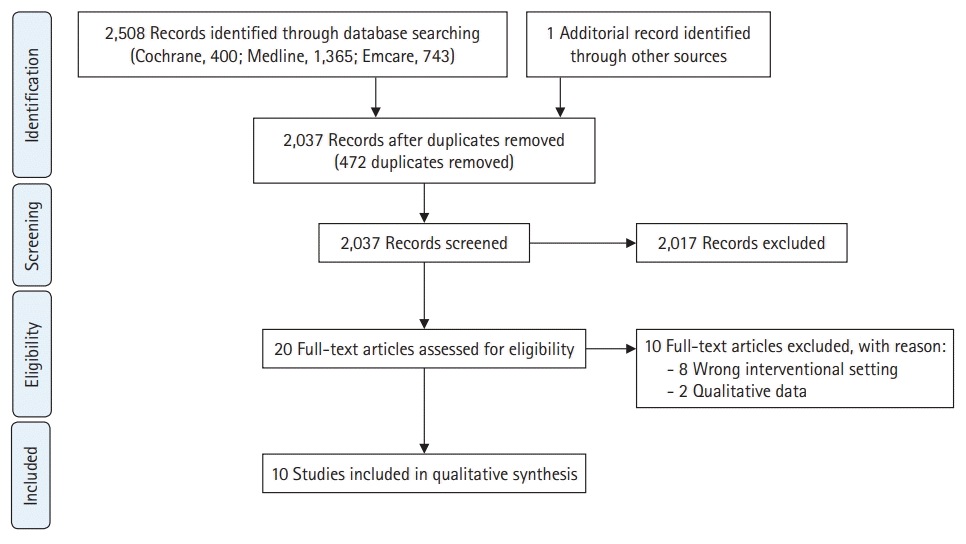1. Butler M, McCreedy E, Schwehr N, Burgess D, Call K, Przedworski J, Rosser S, Larson S, Allen M, Fu S, Kane RL. Improving cultural competence to reduce health disparities. Rockville (MD): Agency for Healthcare Research & Quality;2016.
2. Sorensen J, Norredam M, Dogra N, Essink-Bot ML, Suurmond J, Krasnik A. Enhancing cultural competence in medical education. Int J Med Educ. 2017; 8:28–30.
https://doi.org/10.5116/ijme.587a.0333.

3. Bainbridge R, McCalman J, Clifford A, Tsey K. Cultural competency in the delivery of health services for indigenous people. Canberra: Australian Institute of Health and Welfare, Closing the Gap Clearinghouse;2015.
https://doi.org/10.25816/5ec4ba84d1241.

5. Beach MC, Price EG, Gary TL, Robinson KA, Gozu A, Palacio A, Smarth C, Jenckes MW, Feuerstein C, Bass EB, Powe NR, Cooper LA. Cultural competence: a systematic review of health care provider educational interventions. Med Care. 2005; 43:356–373.
https://doi.org/10.1097/01.mlr.0000156861.58905.96.

7. Renzaho AM, Romios P, Crock C, Sonderlund AL. The effectiveness of cultural competence programs in ethnic minority patient-centered health care: a systematic review of the literature. Int J Qual Health Care. 2013; 25:261–269.
https://doi.org/10.1093/intqhc/mzt006.

8. Alizadeh S, Chavan M. Cultural competence dimensions and outcomes: a systematic review of the literature. Health Soc Care Community. 2016; 24:e117–e130.
https://doi.org/10.1111/hsc.12293.

9. Mason J. Review of Australian Government health workforce programs. Canberra: Department of Health and Ageing;2013.
10. Henderson S, Kendall E, See L. The effectiveness of culturally appropriate interventions to manage or prevent chronic disease in culturally and linguistically diverse communities: a systematic literature review. Health Soc Care Community. 2011; 19:225–249.
https://doi.org/10.1111/j.1365-2524.2010.00972.x.

12. Brown T, Williams B. Evidence-based education in the health professions: promoting best practice in the learning and teaching of students. Boca Raton (FL): CRC Press;2005.
13. Truong M, Paradies Y, Priest N. Interventions to improve cultural competency in healthcare: a systematic review of reviews. BMC Health Serv Res. 2014; 14:99.
https://doi.org/10.1186/1472-6963-14-99.

14. Smith WR, Betancourt JR, Wynia MK, Bussey-Jones J, Stone VE, Phillips CO, Fernandez A, Jacobs E, Bowles J. Recommendations for teaching about racial and ethnic disparities in health and health care. Ann Intern Med. 2007; 147:654–665.
https://doi.org/10.7326/0003-4819-147-9-200711060-00010.

15. Tricco AC, Lillie E, Zarin W, O'Brien KK, Colquhoun H, Levac D, Moher D, Peters MDJ, Horsley T, Weeks L, Hempel S, Akl EA, Chang C, McGowan J, Stewart L, Hartling L, Aldcroft A, Wilson MG, Garritty C, Lewin S, Godfrey CM, Macdonald MT, Langlois EV, Soares-Weiser K, Moriarty J, Clifford T, Tunçalp O, Straus SE. PRISMA Extension for Scoping Reviews (PRISMA-ScR): checklist and explanation. Ann Intern Med. 2018. 169:467–473.
https://doi.org/10.7326/M18-0850.

17. Assemi M, Cullander C, Hudmon KS. Implementation and evaluation of cultural competency training for pharmacy students. Ann Pharmacother. 2004; 38:781–786.
https://doi.org/10.1345/aph.1D402.

18. Arif S, Cryder B, Mazan J, Quinones-Boex A, Cyganska A. Using patient case video vignettes to improve students’ understanding of cross-cultural communication. Am J Pharm Educ. 2017; 81:56.
https://doi.org/10.5688/ajpe81356.

19. Arif S, Wang S, Lakada IY, Lee JY. An elective course to train student pharmacists to provide culturally sensitive health care. Am J Pharm Educ. 2019; 83:7027.
https://doi.org/10.5688/ajpe7027.

20. Boggis D. Effectiveness of a developmental curricular design to graduate culturally competent health practitioners. J Allied Health. 2012; 41:140–146.
21. Prescott GM, Nobel A. A multimodal approach to teaching cultural competency in the doctor of pharmacy curriculum. Am J Pharm Educ. 2019; 83:6651.
https://doi.org/10.5688/ajpe6651.

22. Smith KM, Geletta S, Langan T. Assessment of a cultural competency program in podiatric medical education. J Am Podiatr Med Assoc. 2016; 106:68–75.
https://doi.org/10.7547/14-067.

23. Sales I, Jonkman L, Connor S, Hall D. A comparison of educational interventions to enhance cultural competency in pharmacy students. Am J Pharm Educ. 2013; 77:76.
https://doi.org/10.5688/ajpe77476.

24. Ward A, Mandrusiak A, Levett-Jones T. Cultural empathy in physiotherapy students: a pre-test post-test study utilising virtual simulation. Physiotherapy. 2018; 104:453–461.
https://doi.org/10.1016/j.physio.2018.07.011.

25. Kickett M, Hoffman J, Flavell H. A model for large-scale, interprofessional, compulsory cross-cultural education with an indigenous focus. J Allied Health. 2014; 43:38–44.
26. Jamieson M, Chen SP, Murphy S, Maracle L, Mofina A, Hill J. Pilot testing an intervention on cultural safety and indigenous health in a Canadian occupational therapy curriculum. J Allied Health. 2017; 46:e1–7.
27. Brottman MR, Char DM, Hattori RA, Heeb R, Taff SD. Toward cultural competency in health care: a scoping review of the diversity and inclusion education literature. Acad Med. 2020; 95:803–813.
https://doi.org/10.1097/ACM.0000000000002995.

28. Jongen C, McCalman J, Bainbridge R, Clifford A. Cultural competence in health: a review of the evidence. Singapore: Springer Singapore;2017.
29. Kurtz DLM, Janke R, Vinek J, Wells T, Hutchinson P, Froste A. Health sciences cultural safety education in Australia, Canada, New Zealand, and the United States: a literature review. Int J Med Educ. 2018; 9:271–285.
https://doi.org/10.5116/ijme.5bc7.21e2.





 PDF
PDF Citation
Citation Print
Print





 XML Download
XML Download